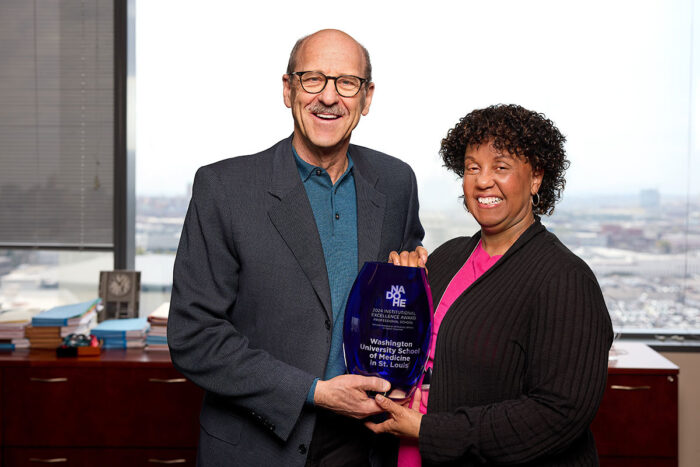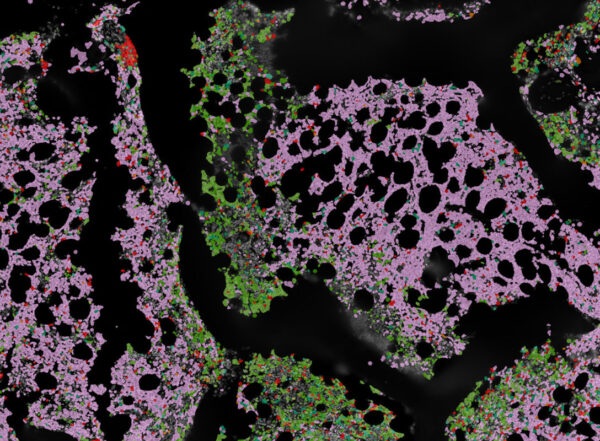Medical school honored with diversity, equity & inclusion award
Racial and health equity, inclusion threaded through school’s mission
 Matt Miller
Matt MillerWashington University School of Medicine in St. Louis has received the 2024 National Association of Diversity Officers in Higher Education Institutional Excellence Award for professional schools. Holding the award is David H. Perlmutter, MD, the George and Carol Bauer Dean, and Sherree A. Wilson, PhD, associate vice chancellor and associate dean of diversity, equity & inclusion for the Office of Diversity, Equity & Inclusion at the School of Medicine.
Washington University School of Medicine in St. Louis has received the 2024 National Association of Diversity Officers in Higher Education Institutional Excellence Award for professional schools. The honor recognizes campuswide work by faculty, staff and students who help foster a diverse and inclusive culture based on collaboration, innovation and best practices.
The award is given to institutions that have demonstrated measurable progress in promoting and sustaining innovative diversity efforts within the campus community. Such efforts include curricular reform, institutional leadership and transformation, assessment policies and practices, professional development, accountability measures, and outreach efforts.
“Creating and sustaining a climate that is diverse and inclusive takes conscious effort and honest reflection,” said David H. Perlmutter, MD, executive vice chancellor for medical affairs, the George and Carol Bauer Dean of the School of Medicine and the Spencer T. and Ann W. Olin Distinguished Professor. “It is reaffirming to see WashU Medicine recognized for our efforts.”
Sherree A. Wilson, PhD, who joined the Medical Campus in 2018 as the school’s inaugural associate vice chancellor and associate dean of diversity, equity and inclusion for the Office of Diversity, Equity & Inclusion (ODEI), said the award is “recognition of WashU Medicine’s schoolwide commitment to diversity, equity and inclusion.
“Our success in large part is due to DEI being embedded as a shared institutional responsibility,” Wilson said. “We’ve intentionally threaded these critical values throughout the school’s mission to support an environment that fosters creative research, health care and education to accomplish the goal of ensuring every person on the Medical Campus feels included and respected.”
Among steps taken at the medical school:
- An increase in diversity among senior leaders serving on the Executive Faculty, the medical school’s primary decision- and policy-makers. In 2017, three of the 26 Executive Faculty leaders were women, and none came from populations underrepresented in medicine. Currently, the group includes seven women and three people from underrepresented populations.
- Since 2017, the school has increased the number of faculty from populations historically underrepresented in medicine and research by 82%, to 215 from 118. Also in that time, female faculty have increased by 46%, to 1,199 from 819.
- Among first-year medical students, 30% of the entering class of 2023 are from populations underrepresented in medicine, double the percentage of such students who entered medical school in 2017. Further, the school’s Gateway Curriculum, launched in 2020, integrates a health equity and justice thread, with an emphasis on social and structural determinants of health, and community outreach.
- In 2021, a “Commitment to Anti-Racism” statement was issued, articulating the school’s intent to address any systemic disparities across its missions. Also, a professional development curriculum — Understanding Systemic Racism, for faculty, staff and trainees — was developed and implemented.
- The Office of Diversity, Equity and Inclusion offers and facilitates DEI education on a broad range of topics, including advancing disability inclusion; inclusive search practices; communications across cultures; and how to be an upstander, one who speaks up, intervenes or interrupts bullying.
- In 2022, the Executive Faculty Task Force on Climate & Culture was established in response to concerns about elements of the culture that can lead to a negative atmosphere for people of color and other members of the WashU Medicine community. The task force in 2023 released a report with recommendations on how to foster a more inclusive climate and culture, and has begun implementing those recommendations.






